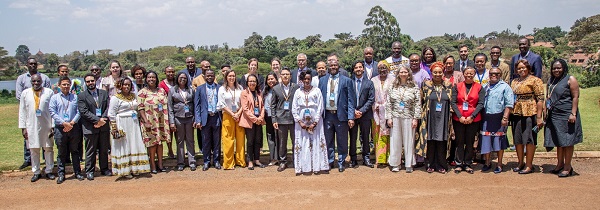
Countries in the global South have been strongly encouraged to streamline their regulatory strategies for new food breeding techniques and biotechnology, in a bid to harness the potential of cutting-edge biotechnological advancements, countries across.
These techniques, known as new breeding techniques (NBTs), encompass an array of innovative tools that hold significant promise in the realms of both animal and plant science. Biotechnology, on the other hand, involves the utilisation of biological systems, living organisms, or their components to create diverse products.
Presently, two dominant biotechnological methods are genome editing and genetically modified organisms (GMOs). Numerous nations worldwide, including eleven in Africa, have already granted approvals for genetically modified crops. The CEO of Kenya’s National Biosafety Authority (NBA), Roy Mugiira underlined that several countries both in the global North and South have embraced a unified approach to overseeing these novel technologies. He emphasised that countries in the global South should adopt similar strategies to promote effective regulation.
Mugiira pointed to the United Kingdom as an example, citing its legislation that mirrors the approaches taken by other forward-thinking nations. Moreover, he lauded Kenya and Argentina for their leadership roles in defining science-based regulatory frameworks for these novel techniques. Their efforts seek to strike a balance between driving innovation and ensuring safety in the realm of bio-innovation.
These sentiments were expressed during the South-South Collaboration for Innovations Workshop held in Nairobi, Kenya. The event, organised by the Alliance for Science in partnership with the National Direction of Bioeconomy of Argentina and the National Biosafety Authority of Kenya, convened over 40 technical and policy officials from African, Latin American and Asian nations. These officials play significant roles in either shaping policies or executing regulations associated with emerging agricultural technologies.
The workshop had Argentina’s gene editing approach as a central case study, providing a platform for discussions on how governments can facilitate local scientists in generating innovative solutions to address pressing concerns such as food security, biodiversity and climate change. Mugiira emphasised that the workshop was taking place amidst an era of remarkable advancements in bio-innovation and the concomitant evolution of regulatory frameworks.
One of the key figures at the event and the global director for policy at the Alliance for Science, Pablo Orozco outlined one of the workshop’s primary objectives – to foster knowledge exchange regarding regulatory approaches to gene editing that empower local innovation. Orozco stressed the valuable lessons that countries in the Global South can glean from one another’s experiences in regulating new technologies.
He advocated for enhanced collaboration across the globe, transcending the conventional regional divisions of Africa, Latin America, Asia and Southeast Asia. Orozco underlined the need for such collaboration to effectively leverage the burgeoning technologies within their respective countries.
The executive director of the Alliance for Science, Dr. Sheila Ochugboju highlighted the pervasive misinformation surrounding biotechnology and urged global South nations to unite in dispelling this misinformation. Drawing a striking analogy, she likened the misinformation to a tsunami, further emphasising that the Alliance would continue to address such challenges not only in biotechnology but also in global health communication.
In a research report published by the Alliance for Science in 2022, it was revealed that approximately one-fifth of Africa’s media coverage on GMOs contained misinformation. This underscores the pressing need for accurate information dissemination to enable informed decision-making.
The workshop coincided with the Association of Environmental Law Lecturers in African Universities (ASSELLAU)’s 5th Scientific Conference and General Assembly in Nairobi. During this conference, Prof. Hamudi Majamba from the University of Dar es Salaam’s School of Law highlighted the struggle faced by African countries as they strive to establish their own biotechnology regulations. Simultaneously, regional blocs such as the East African Community (EAC), the Southern Africa Development Community (SADC) and the Economic Community of West African States (ECOWAS) are independently formulating similar regulations, potentially leading to conflicts.
Majamba drew attention to tensions within the EAC, specifically between Kenya and Tanzania. This tension stemmed from the approval of biotech farming and imports in Kenya, which could inadvertently lead to the introduction of such products into Tanzania – a country that has not yet legalised them.
At present, only seven African countries possess laws governing GMOs, a statistic that underscores the importance of implementing biosafety and food/feed safety regulations within a comprehensive international framework. Mugiira emphasised the necessity of synchronising biotechnological developments with effective communication to facilitate informed policy and legislative formulation.
Reflecting on past challenges, Mugiira noted that the development of biotechnologies had often outpaced effective communication efforts, leading to widespread misinformation. He emphasised the importance of rectifying this issue, stressing the need to communicate in tandem with technological advancements and regulatory conceptualisation.
Mugiira also highlighted the challenge posed by overlapping public perceptions of various new breeding tools, including gene editing and genetic modification. He noted the lack of clarity among the public regarding the distinctions between these techniques. Standardising terminology for new breeding techniques emerged as another imperative, aimed at enhancing effective communication and preventing the erroneous perception that certain techniques are inherently safer than others.
In conclusion, the imperative for harmonising regulatory frameworks for biotechnology stands as a critical call to action for countries in the global South. As demonstrated by Kenya and Argentina, a coordinated approach to regulation can facilitate innovation while ensuring safety. Through collaborative workshops and knowledge exchange, nations can pool their experiences to develop effective strategies for regulating emerging agricultural technologies. Such collaboration is not only crucial for effective regulation but also for dispelling misinformation and facilitating informed decision-making in the dynamic landscape of biotechnology.

